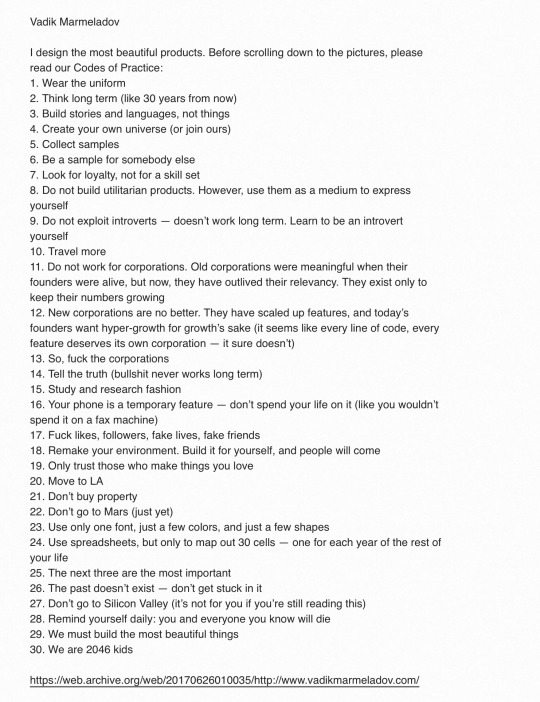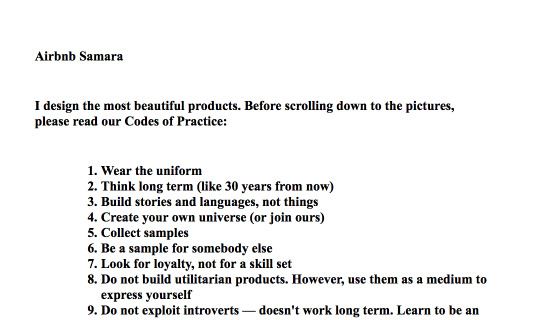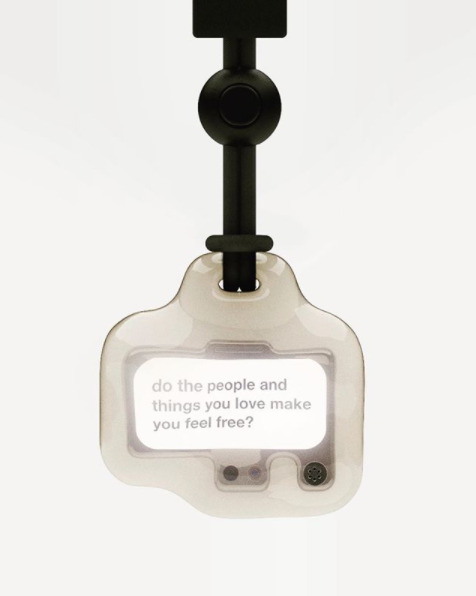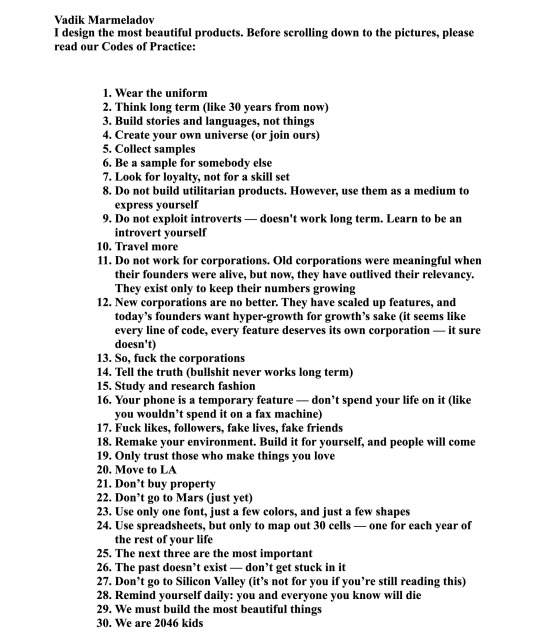#Vadik Marmeladov
Photo






packaging for oem.care by vadik marmeladov
repost from @xxds8
#Vadik Marmeladov#oem care#product design#Industrial Design#white#white moodboard#white aesthetic#packaging#packaging design#cosmetics#body care
92 notes
·
View notes
Text
2 notes
·
View notes
Photo

https://web.archive.org/web/20170626010035/http://www.vadikmarmeladov.com/
1 note
·
View note
Text
Work Futures Daily - Marching Backwards Into The Future
The anthropology of the future is the study of ourselves. | Claude Lévi-Strauss
2018-04-09 Beacon NY - Yesterday, I touched on David Evans' thoughts on being a futurist.
'Futurist' sounds somewhat pretentious, so I often say I am a anthropologist of the future, or a work ecologist, because ecology and anthropology, while 'soft' sciences, are not so squishy as 'futurology' is.
In the piece, yesterday I used the Marshall McLuhan quote:
We look at the present through a rear-view mirror. We march backwards into the future.
and I noted that when we look into McLuhan’s rear-view mirror we are seeing ourselves just as much as the road behind. And that looking at ourselves in the rearview mirror, that self-study, that's the anthropology I am up to, whatever name you call it.
Sign up here for notifications of free posts.. I'll get you to subscribe eventually, I bet.
On Automation, Walmart, and the World
The great debate about automation's role in decreasing work is unresolved, but new research suggests it is decreasing the proportion of money flowing to workers, even if it is not decreasing the total number of jobs:
Walmart has doubled its use of self-checkouts in stores, according to a recent investor presentation, and newly remodeled locations have fewer lanes staffed with a cashier. What’s more, inside its Store No. 8 incubator, which is experimenting with technologies such as robotics, virtual and augmented reality, and artificial intelligence, Walmart is, according to Recode, developing Project Kepler—a store similar to Amazon Go with no checkout lines or cashiers.
In theory, automation doesn’t have to eliminate jobs, on balance, or drive down worker pay. It could free up workers to do higher value, better-paid tasks. It could generate consumer demand and create new categories of jobs.
David Autor of MIT and Anna Salomons of Utrecht University recently published a study on automation that examined data on 28 industries in 18 countries in the OECD. They find that, since 1970, automation hasn’t reduced jobs—in fact, it has slightly increased them. But since the beginning of the 2000s, automation has reduced workers’ share of national income. “This finding is consistent with automation having become in recent decades less labor-augmenting and more labor-displacing,” they write.
According to their research, workers’ employment, hours, or wages haven’t fallen. But wages have risen less rapidly than overall economic growth, with owners getting an increasingly large share. Autor suggests this trend could continue as automation increases. “No, the robots will not take all of our jobs,” he says in a Brookings video. “The concern should not be about the number of jobs, but whether those jobs are jobs that can support a reasonable standard of living.”
Walmart envisions a future of retail with far fewer workers on the floor, and while those may be better compensated, many of the people involved in the supply chain to get groceries from their point of origin to your home may be on demand freelancers, working for Uber-esque services that Walmart doesn't directly control. Or replaced by partially or fully automated steps in the supply chain, like autonomous trucks, warehouse robots, and drone delivery services.
Walmart is the brick-and-mortar retail chain who is investing the most time and effort into the game-changing revolution that Amazon is bringing online. Expect massive disruption, economically and societally.
…
Over at the MIT Technology Review, Will Knight calls the US government to wake up to the threat of other governments investing huge amounts in AI, like China, France, and others, so that we don't fall behind in basic research. He takes a few paragraphs away from his breathless techno-utopianism to mention possible negatives, but only a few:
But a government AI policy must go beyond calls for research funding.
While AI can drive economic growth, it may also accelerate the eradication of some occupations, transform the nature of work in other jobs, and exacerbate economic inequality (see "The relentless pace of automation"). It is critical that governments prepare for this transformation. This might mean exploring ways to find training and employment opportunities for those who have lost jobs to automation and AI. Academic experts and institutions have been sounding the alarm over this issue and have warned that it might have serious social consequences. Those problems will surely require government action.
"Planning for job displacement that AI will cause is best done by government," says Andrew Ng, a prominent AI researcher who was previously the chief scientist at Baidu and is now involved with several different AI projects.
The big problem with this minimal backstop to the impacts of automation is that there are functionally zero good examples of such broad retraining. As a result, the comment by Andrew Ng is useless: it doesn't matter who does the planning for job displacement if retraining doesn't work well.
Of course, that sentiment could just be a smokescreen, allowing that enormous and increaingly profitable tech multinationals to externalize the costs of social disruption by automation, while increasingly poor governments, starved of capital by endless austerity budgets and low corporate tax rates, struggle or completely fail to accomplish the retraining.
On Network Publicy Governance
I was mentioned in a tweet today, thanking me for inspiration for a 2018 Digital Society book, Network Publicy Governance. My contribution was the term 'publicy' and the concept behind it.
I have not read the book in its entirety, just scanned it, but the authors, Andreá Belliger and David Krieger, are motivated by this goal:
The occasion for this book is the growing conflict between the call for a “data-driven” society on the one side and the demand for ensuring individual freedom, autonomy, and dignity by means of protecting privacy on the other. Gathering and exploiting data of all kinds in ever greater quantities promises to create value and efficiency in business, education, healthcare, social services, energy, transportation, and almost all other areas of society. But at the same time, fears of loss of privacy lead to ever more prohibitive regulations.
The Facebook Follies show up again.
They go on:
It would seem that we are entering the 21st Century with society divided into those who believe that as much information as possible should be integrated into decision-making in all areas and at all levels and those who believe that human freedom, autonomy, and even dignity depend on secrecy and the withholding of as much information as possible. This book is an attempt to analyze the causes of this deep conflict in Western societies. Furthermore, it attempts to offer a perspective on how we might move forward into a world which is at once based on data and on a self-understanding of the human individual as an informational self whose freedom and dignity do not depend on privacy.
[...]
We will not rehearse the usual narrative of freedom, autonomy, and dignityin terms of inequalities and power struggles between weak individuals on the one side and overpowering corporations and governments on the other. Instead, we will attempt to reformulate these issues in terms of networks.
[…]
From the network perspective, social theory in general and privacy discourse, in particular, can no longer proceed from the assumption that weare dealing with clearly bounded unities, whether individual, organizational, or governmental. When actors become networks, that is, when actors are constituted in networks and exist as networks, then they enter into a condition that can be considered to be the “default” condition of humans in society. This condition, following Stowe Boyd, can be termed “publicy.” Publicy is not publicity. It is not the state of being known, but the condition of being an informational self. In contrast to the essentially private individual of Western modernity, the informational self is not an isolated individual that somehow secondarily enters into social contracts, but a hybrid and heterogeneous ensemble of associations that are always already social. The informational self is constitutively linked up to others, both human and nonhuman.
Just an introduction to the book, which seems to be freely available on Academia.edu.
Those interested in publicy might enjoy this, The Decade Of Publicy, and Secrecy, Privacy, Publicy, or this piece from the NY Times about the term, Schott's Vocab: Publicy.
On Life
Via Warren Ellis, Vadik Marmeladov's Code Of Practice
Wear the uniform
Think long term (like 30 years from now)
Build stories and languages, not things
Create your own universe (or join ours)
Collect samples
Be a sample for somebody else
Look for loyalty, not for a skill set
Do not build utilitarian products. However, use them as a medium to express yourself
Do not exploit introverts — doesn't work long term. Learn to be an introvert yourself
Travel more
Do not work for corporations. Old corporations were meaningful when their founders were alive, but now, they have outlived their relevancy. They exist only to keep their numbers growing
New corporations are no better. They have scaled up features, and today’s founders want hyper-growth for growth’s sake (it seems like every line of code, every feature deserves its own corporation — it sure doesn't)
So, fuck the corporations
Tell the truth (bullshit never works long term)
Study and research fashion
Your phone is a temporary feature — don’t spend your life on it (like you wouldn’t spend it on a fax machine)
Fuck likes, followers, fake lives, fake friends
Remake your environment. Build it for yourself, and people will come
Only trust those who make things you love
Move to LA
Don’t buy property
Don’t go to Mars (just yet)
Use only one font, just a few colors, and just a few shapes
Use spreadsheets, but only to map out 30 cells — one for each year of the rest of your life
The next three are the most important
The past doesn’t exist — don’t get stuck in it
Don’t go to Silicon Valley (it’s not for you if you’re still reading this)
Remind yourself daily: you and everyone you know will die
We must build the most beautiful things
We are 2046 kids
Sign up here for notifications of free posts.. I'll get you to subscribe eventually, I bet.
Question or comment? (Can be private, or public: your choice. I occasionally publish public comments or questions.)
Follow me on Twitter.
More media, politics, and social commentary on stoweboyd.com, including bio.
#vadik marmeladov#publicy#publicy governance network#automation#walmart#claude levi strauss#david evans#Work Futures Daily
5 notes
·
View notes
Photo

Lapka Breath Alcohol Monitor – Vadik Marmeladov
1 note
·
View note
Quote
The future of fashion isn’t smart-garments, sensors or gadgets. The future of media isn’t paid internet subscriptions. The future of tech isn’t AI. The future is always the culture.
Vadik Marmeladov
6 notes
·
View notes
Text
Vadik Marmeladov I design the most beautiful products. Before scrolling down to the pictures, please read our Codes of Practice: 1. Wear the uniform 2. Think long term (like 30 years from now) 3. Build stories and languages, not things 4. Create your own universe (or join ours) 5. Collect samples 6. Be a sample for somebody else 7. Look for loyalty, not for a skill set 8. Do not build utilitarian products. However, use them as a medium to express yourself 9. Do not exploit introverts — doesn't work long term. Learn to be an introvert yourself 10. Travel more 11. Do not work for corporations. Old corporations were meaningful when their founders were alive, but now, they have outlived their relevancy. They exist only to keep their numbers growing 12. New corporations are no better. They have scaled up features, and today’s founders want hyper-growth for growth’s sake (it seems like every line of code, every feature deserves its own corporation — it sure doesn't) 13. So, fuck the corporations 14. Tell the truth (bullshit never works long term) 15. Study and research fashion 16. Your phone is a temporary feature — don’t spend your life on it (like you wouldn’t spend it on a fax machine) 17. Fuck likes, followers, fake lives, fake friends 18. Remake your environment. Build it for yourself, and people will come 19. Only trust those who make things you love 20. Move to LA 21. Don’t buy property 22. Don’t go to Mars (just yet) 23. Use only one font, just a few colors, and just a few shapes 24. Use spreadsheets, but only to map out 30 cells — one for each year of the rest of your life 25. The next three are the most important 26. The past doesn’t exist — don’t get stuck in it 27. Don’t go to Silicon Valley (it’s not for you if you’re still reading this) 28. Remind yourself daily: you and everyone you know will die 29. We must build the most beautiful things 30. We are 2046 kids https://web.archive.org/web/20170626010035/http://www.vadikmarmeladov.com/
23 notes
·
View notes
Photo


earphones for ye by vadik marmeladov
ep can be complemented with separate attachment-like devices
#vadik marmeladov#ye#kanye west#industrial design#product design#red#red aesthetic#sunrise#earphones#headphones
20 notes
·
View notes
Text

0 notes
Text
Kanye West y un proyecto de viviendas sociales
http://ifttt.com/images/no_image_card.png
Se espera que la primera incursión de Kanye West en la arquitectura sea un proyecto de vivienda prefabricada de concreto asequible, que ha surgido un mes después de que anunciara un nuevo brazo de su marca de moda Yeezy.
El 3 de junio de 2018, apareció en Instagram una versión del proyecto de vivienda social, que sugiere que será el proyecto inicial de Yeezy Home, el proyecto de arquitectura que el artista y productor de hip-hop publicitó el mes pasado con la ambición de “hacer un mundo mejor”.
La imagen fue publicada por el diseñador de moda Jalil Peraza, quien previamente trabajó en la marca DONDA de West. Se trata de un edificio de hormigón dispuesto alrededor de un patio, con una abertura a la habitación en el fondo con un fuego ardiendo.
El epígrafe de Peraza lo describe como un “plan de viviendas para personas de bajos ingresos, hechas de hormigón prefabricado”, y se acredita a sí mismo y a West como parte de un equipo de diseño que también incluye a Petra Kustrin, Nejc Skufca y Vadik Marmeladov.
Dos representaciones más del esquema adquirido por Hypebeast muestran los grandes ventanales del patio que aportan mucha luz natural a los interiores. Los acabados simples – como las paredes blancas, los pisos expuestos y los marcos negros de las ventanas – son similares al estilo a rayas de la marca de moda Yeezy de West.
La prefabricación ayudaría al equipo a construir la vivienda de forma rápida y barata. Sigue una estrategia similar a la de la empresa de Peraza Face Modules, que proporciona volúmenes prefabricados para espacios como tiendas, oficinas y estudios de yoga y diseño.
Desde que estableció la fama con su música, West ha sido vocal acerca de su pasión por la arquitectura en entrevistas y en los medios de comunicación social durante muchos años. Durante una visita a la Harvard Graduate School of Design en 2013, dijo a los estudiantes que “el mundo puede salvarse a través del diseño”.
Yeezy Home forma parte de la empresa de moda Yeezy que el rapero americano desarrolló en colaboración con la marca de ropa deportiva Adidas y lanzó en 2015. Las colecciones son muy populares y por lo general se agotan inmediatamente.
Mientras que algunos han sido escépticos sobre la experiencia arquitectónica de West, el “arquitecto hip-hop” Michael Ford recientemente habló con Dezeen sobre la importancia de los músicos negros que promueven su participación en la arquitectura, para mejorar la diversidad en la profesión.
Leer también Bicblock diseña apartamentos de 18 m2 en Londres con un sistema modular estándar integrado
La entrada Kanye West y un proyecto de viviendas sociales se publicó primero en Colegio de Arquitectos.
0 notes
Photo

Vadik Marmeladov
vadikmarmeladov.com
0 notes
Photo

17 notes
·
View notes
Text
The Wildest Design Yet For Google's Project Ara Phone
Russian design firm Lapka tells us that everyone behind Project Ara may be missing the point. Google's Project Ara is one of the company's most ambitious projects. It's a modular phone, in which users could snap in new cameras, batteries, or processors as quickly as snapping together Lego. Read Full Story http://bit.ly/1GDKbXB #fb #sm #social
0 notes


